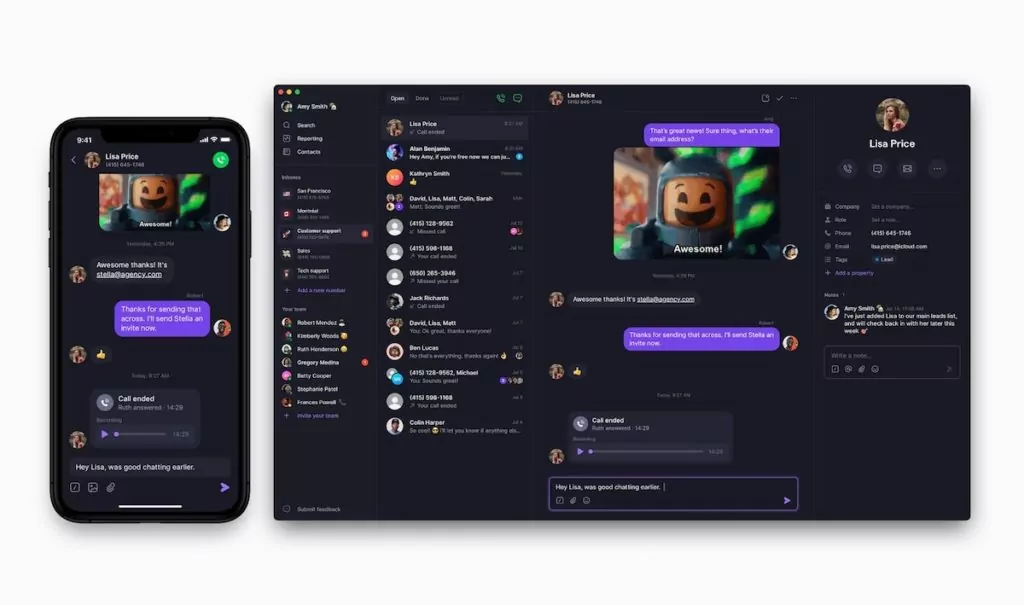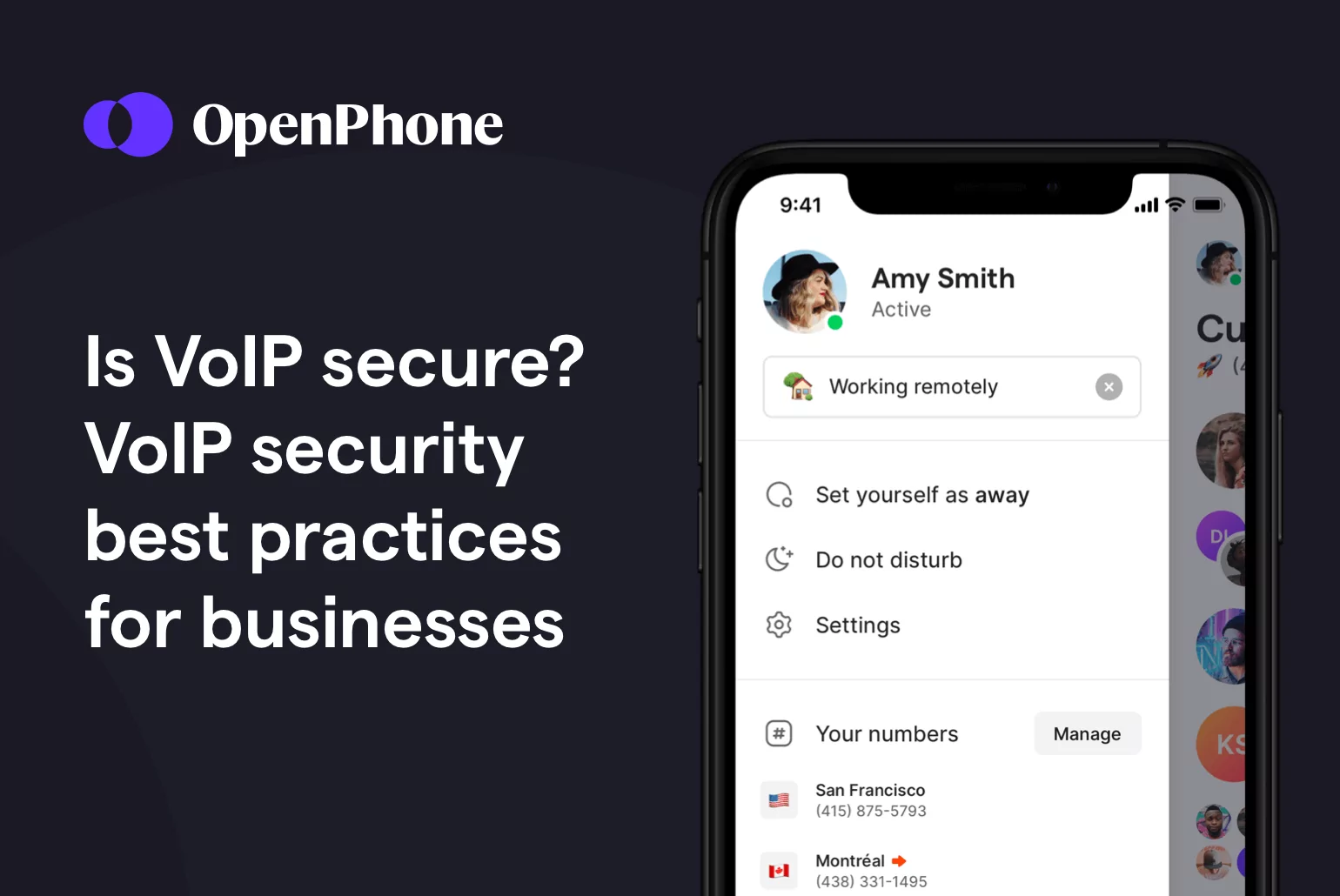When you’re sharing business secrets, credit card numbers, or other sensitive information on your calls, you want to make sure what happens on your business phone system stays on your business phone system. Protecting customers (and your business) is one of your top priorities. While going digital with a Voice over Internet Protocol phone may be a clear win in terms of price and functionality, you need to evaluate if VoIP offers the level of security you’re looking for.
So, is VoIP secure? We’ll help you compare VoIP services to traditional phone systems, then help you select a VoIP provider you can trust.
Is VoIP secure?
VoIP phone systems can be highly secure. Since VoIP calls are placed over the internet, your service provider can put a number of security measures in place to protect your business calls. For example, services like OpenPhone encrypt your communications and business data. You’ll get a virtual shield that’s simply not available for standard landlines or cell phones. 🛡️
On top of the VoIP security your provider offers, businesses can keep their Voice over IP phones secure just by putting basic cybersecurity measures in place. For example, simply having firewalls and antivirus software on your devices can ward off plenty of security issues that you might face.
Though no phone system can be completely secure, VoIP apps can offer a number of benefits over a traditional phone system.
VoIP vs. traditional phone systems
Traditional phone systems use physical wires to send voice messages between you and your caller. Though landlines can’t be attacked over the internet, there are still several security factors to consider, like wiretapping and line cutting where there’s access to your physical phone lines. And since your calls can’t be encrypted, your messages aren’t protected at all. Once your lines are wiretapped, criminals can listen to your entire phone conversations without having to decode them at all. 👂
Toll fraud — in which your phone lines are used to make tons of costly international calls — can also be a big issue with landlines, since there’s no way to track real-time call logs.
Though no phone system can guarantee 100% security, VoIP security options are getting more advanced by the day. VoIP providers can offer multiple layers of encryption, making it much more difficult for bad actors to steal your data or otherwise stall your business.
Bottom line: Landlines aren’t really being innovated upon anymore. VoIP services, because they’re maintained through software development, are being continually upgraded and made more secure as companies improve the product.
How to select a secure phone provider
While VoIP systems have strong security advantages over traditional phone services, not every VoIP provider is equally as secure.
VoIP calls use a protocol called Session Initiation Protocol (SIP) to manage the voice and text messages between endpoints — for example, you and your client. Unfortunately, SIP alone doesn’t encrypt these messages. Only a secure VoIP provider that takes the right steps to protect clients can provide VoIP security that’s equal to or better than landline security.
To select a system you can trust, you need to examine the phone system features that can impact your VoIP security. Ask service providers about these three items before narrowing down your ideal VoIP solution.
1. Call encryption
Since SIP doesn’t encrypt messages, it’s important to find a VoIP provider that will do so for you. OpenPhone, for instance, uses WebRTC technology, which means it uses WebSockets via Transport Layer Security (TLS) encryption to protect each of your calls. Similarly, text messages are encrypted as they move between the OpenPhone app and the carrier.
2. Infrastructure
We all know a house made of bricks is better than one made of straw or sticks. Similarly, you want to make sure your provider’s information technology (IT) infrastructure holds up when hackers try to blow your house down. 🌬️
If you want to maximize your VoIP security, choose a provider that takes security measures to secure all your data — not just your calls. OpenPhone secures your data by:
- Using the Amazon Web Services infrastructure and 256-bit AES encryption
- Backing up data daily — and hourly for high-priority databases
- Storing data in redundant databases across several physical locations
- Protecting services with Cloudflare
- Following General Data Protection Regulation (GDPR) and the California Consumer Privacy Act (CCPA) principles
3. Call logs
Secure VoIP providers allow you to check your call logs in real time. If there’s any suspicious activity happening, you’ll be able to catch it early on. This gives VoIP security a huge advantage over landline security (on top of all the other advantages VoIP provides). Whereas toll fraud can happen right under your nose with landlines until you get your bill, VoIP systems allow you to be more proactive about cybersecurity.
OpenPhone lets you review all of your call history and messages immediately just by heading to your conversation threads.
VoIP security best practices
Signing up for a phone system that takes strong security measures is a great start to keeping your calls secure. However, taking extra steps as a team is the best way to get added protection against hackers. Here are six ways you can reduce your security vulnerabilities even further.
1. Educate your team members
When your staff understands how to spot and avoid security threats, they’ll be able to help you protect your calls and data. Educate your team about common cybersecurity risks such as malware and denial-of-service (DoS) attacks.
You can also teach them about general phone scams that can occur regardless of whether you’re using softphones, landlines, or other physical devices. For example, you can explain how to identify scams like voice phishing (or vishing), in which call recipients are tricked into providing sensitive information.
2. Encrypt your WiFi
Setting up WiFi encryption is a simple way to boost your VoIP security and prevent hackers from eavesdropping on your conversations. Make sure to set up WPA2 or WPA3 security with a strong WiFi password — and have your employees do so too — instead of sticking with WEP, which is an outdated wireless network security protocol. WPA2 and WPA3 stand for WiFi protected access 2 and 3 and provide high levels of security. If these security options aren’t available on your network, you’ll need to purchase a newer router.
3. Consider using VPNs
Virtual private networks (VPNs) protect your VoIP phone calls by encrypting your actual internet connection. VPNs also hide your IP address to secure your online activities. If your team is working remotely, VPNs can enhance your VoIP security all around the world. 🌎
Be sure to use a business-grade VPN solution so that your VPN provider gives you enough bandwidth to prevent call degradation.
4. Update your offboarding process
Unhappy workers can be one of your biggest security risks. 🚨 Research shows over half of employees take data as they leave their companies, and many use this information in their next job. Others may try hacking into your phone system with more malicious intent.
One of the simplest ways to keep VoIP secure is by deactivating users when team members leave your organization, whether or not it’s on good terms. This way, they won’t be able to log in and access your VoIP phone data.
5. Require strong passwords
Maintaining a strong password policy in your workplace is a must for ensuring hackers can’t access your calls, texts, and other data through your employees’ accounts. Require your team members to use a combination of lowercase and uppercase letters, numbers, and symbols. You can also require employees and teams to change their passwords every one to three months.
6. Keep your operating system up-to-date
Ignoring updates is a big cybersecurity red flag. 🚩 Software updates offer added protection from vulnerabilities — including newly discovered ones that are sometimes urgent to resolve. When your computer or smartphone informs you an operating system update is available, don’t delay it any longer than you have to.
Have confidence in your VoIP security with OpenPhone

Voice over IP telephony allows you to protect your business phone calls with cybersecurity measures and ensure you don’t have any physical vulnerabilities to worry about. As long as you select a VoIP provider that offers encryption and data protection — and take security measures of your own — your VoIP security can be just as strong as your landline security, if not stronger.
VoIP doesn’t just offer security benefits. Compared to traditional phone systems, it offers functionality beyond the standard voicemail and VoIP call routing features. OpenPhone allows you to share phone numbers with your team members so you can collaborate on conversations and integrate with business apps like Slack and HubSpot CRM. Start your free trial of OpenPhone now.
